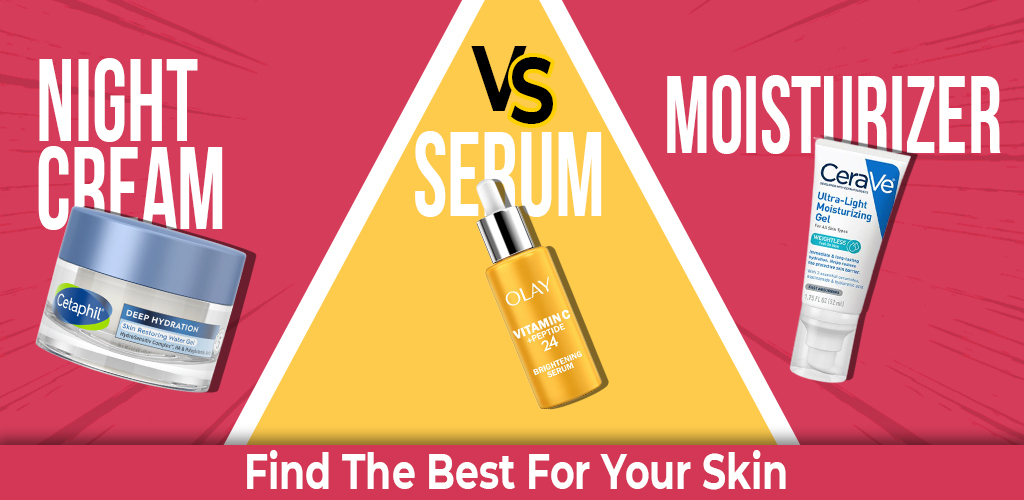Night Cream vs. Moisturizer vs. Serum: Which Is Best for Your Skin?

Various skincare products are in the market, so deciding which is the best for your skin has become challenging. One of the most debated questions in the skincare industry is night cream vs moisturizer vs serum. Each product has unique features, and it is crucial to understand the differences before choosing the right one.
Many questions can pop into your mind, such as, should I use all three? Are they interchangeable? Whether you’re facing dryness, dullness, wrinkles, or fine lines, this blog will explain everything you need to know and help you make informed choices based on your skin type.
What Is a Night Cream?
A night time moisturizer is a specialized skincare product that works while you sleep. It leverages the body’s natural repair and regeneration cycle, which peaks at night. Unlike daytime moisturizers, night creams often have a more prosperous, thicker consistency and are packed with potent ingredients like retinol, peptides, ceramides, and hyaluronic acid.
The best night cream for aging skin is the one that has all of the mentioned ingredients. These ingredients work wonders for your skin, removing dark spots and aging signs. Night time moisturizers are free of sunscreen and focus entirely on hydration and deep nourishment. There are various importance & benefits of night cream. A hydrating night cream is a key ally in fighting the signs of aging and environmental stressors.
What Is a Moisturizer?
A moisturizer has several benefits and is designed to hydrate and protect the skin from moisture loss throughout the day. The best moisturizers for dry, cold weather are typically formulated with humectants (like glycerin or hyaluronic acid), emollients (such as oils or butter), and occlusives (like petroleum jelly or dimethicone). Moisturizers balance drawing in water, smoothing skin texture, and sealing hydration.
They cater to many skin types and concerns, from oily and acne-prone to dry and sensitive. The best moisturizers for aging skin are essential in the daytime skincare routine, leading to plump and healthy skin.
What Is a Serum?
A serum is a highly concentrated skincare product formulated to deliver targeted active ingredients deep into the skin. Unlike creams or moisturizers, serums have a lightweight, fast-absorbing texture that allows them to penetrate the skin more effectively. They are designed to address specific skin concerns, such as fine lines, dark spots, acne, or uneven texture, making them a powerful tool in any skincare routine.
You can add effective ingredients like vitamin C or niacinamide for best results. You can add the Ordinary niacinamide serum. Common active ingredients found in serums include vitamin C for brightening, retinol for anti-aging, niacinamide for reducing redness, and salicylic acid for combating blemishes. Serums are typically applied after cleansing and before moisturizing to ensure maximum efficacy. They act as the treatment step in your routine to provide noticeable, long-term improvements.
Differences Between Night Cream vs Moisturizer vs Serum
Here’s a table highlighting the differences between night cream vs moisturizer vs serum:
| Differences/Features | Night Cream | Moisturizer | Serum |
| Primary Purpose | Repairs and regenerates skin overnight | Hydrates and protects the skin barrier | Targets specific skin concerns |
| Consistency | Thick and rich | Medium to thick, varies by formula | Lightweight, watery, or gel-like |
| Key Ingredients | Retinol, peptides, ceramides, oils | Humectants, emollients, occlusives | Active ingredients (e.g., vitamin C, retinol, niacinamide) |
| Application Timing | Evening | Morning and/or evening | Morning and/or evening |
| Absorption | Slow to absorb, it forms a protective layer | Moderate absorption | Rapid absorption for deeper penetration |
| SPF Inclusion | Typically none | Often contains SPF (daytime use) | Rarely includes SPF |
| Best For | Dry, aging, or stressed skin at night | All skin types, maintaining moisture | Addressing specific concerns like acne, wrinkles, or dullness |
| How to Use | Apply as the final step at night | Apply after serum or toner | Apply after cleansing, before moisturizer |
Night Cream vs Moisturizer vs Serum: What Should You Use?
Firstly, identify your skin type and its needs, then decide which one is suitable to use: night cream vs moisturizer vs serum. Use a hydrating night cream for sensitive skin or a serum for treating specific skiing problems. Following is a brief explanation for each cream:
Night Cream:
The best night cream for aging skin is specifically formulated to work in sync with your skin’s natural repair processes during the night. They are typically thicker and more nourishing than daytime products, packed with ingredients like peptides, retinol, and ceramides to target concerns such as fine lines, wrinkles, and uneven skin texture.
Night creams focus on deep hydration and replenishing the skin’s barrier after exposure to environmental stressors throughout the day. A night time moisturizer is ideal for dry or aging skin; it seals in moisture and allows active ingredients to work uninterrupted while you sleep.
Bonus Read: Want to know why should we use night cream separately? Check out our blog.
Moisturizer:
Moisturizers are the backbone of any skincare routine. They are designed to keep your skin hydrated and maintain its moisture barrier. Formulated to suit various skin types and concerns, they are for both oily and sensitive skin. Knowing what you need can help you choose the best skincare for dry skin.
Moisturizers often combine humectants, emollients, and occlusives to draw moisture into the skin, smooth its texture, and lock in hydration. Many daytime moisturizers also include SPF, providing essential sun protection alongside hydration.
Serum:
Serums are concentrated, fast-absorbing products that deliver active ingredients deep into the skin to target specific concerns. Whether you’re addressing wrinkles, hyperpigmentation, acne, or dullness, there’s a serum tailored to your needs.
These potent formulas are typically lightweight, making them easy to layer under moisturizers. Moreover, the skin renewing retinol serum is a must-have product after 30’s. Serums are essential to a treatment-focused skincare routine that provides a customizable approach for adjusting according to your skin changes.
Bonus Read: Here’s a guide to using face serum for skin.
Benefits of Incorporating These Products into Your Skincare Routine
There are multiple benefits of night cream vs moisturizer vs serum. Let’s discuss the benefits of using each for your skin:
Night Cream:
- Supports overnight skin repair and regeneration.
- Deeply hydrates and nourishes the skin.
- Targets signs of aging like wrinkles and fine lines.
Moisturizer:
- Maintains hydration and strengthens the skin barrier.
- Protects against environmental damage and dryness.
- Suitable for daily use, with options for all skin types.
Serum:
- Provides targeted solutions for specific concerns (e.g., acne, dark spots, aging).
- Enhances the efficacy of your skincare routine with potent actives.
- Boosts overall skin health and radiance.
Pro Tip: Explore our Skin Care range and select the best options for your skin features.
FAQs – Night Cream vs Moisturizer vs Serum
Which is better, night cream or serum?
It depends on your skin needs—serums target specific concerns, while night creams focus on hydration and repair.
Do I need both serum and night cream?
Both can be beneficial; serums treat specific issues, and night creams provide hydration and lock in the serum’s benefits.
Can I skip moisturizer and use serum at night?
No, serums don’t replace moisturizers; you need a moisturizer or night cream to seal in the serum and prevent moisture loss.
Wrap Up!
Choosing the right skincare products doesn’t have to be overwhelming. Understanding the unique benefits of night cream vs moisturizer vs serum empowers you to create a routine tailored to your skin’s needs. Each product plays an essential role: night creams work their magic while you sleep, moisturizers provide imperative hydration and protection, and serums offer targeted solutions for stubborn skin concerns.


